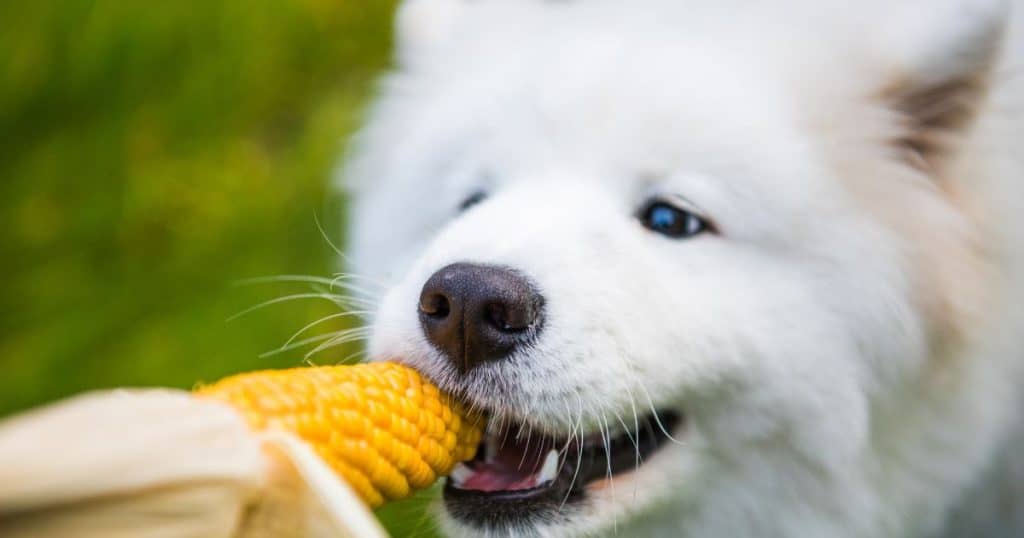What to Know
When it comes to feeding our furry friends, understanding potential allergies is crucial for ensuring their health and well-being. One commonly discussed food item in this context is corn. Have you ever found yourself wondering if are dogs allergic to corn?
In this article, we’ll explore the prevalence of corn allergies in dogs, the symptoms of such an allergy, and pertinent advice about feeding corn to your canine companions. Armed with this information, you’ll be better equipped to make informed decisions about your dog’s diet and their overall health.
Understanding Dog Allergies

Dog allergies occur when a dog’s immune system reacts to a foreign substance, such as pollen, flea saliva, or food ingredients.
Common Allergens
Food allergies in dogs typically stem from ingredients like beef, chicken, corn, wheat, soy, and dairy products. However, corn allergies in dogs are relatively rare. Apart from food, dogs can also be allergic to pollen, flea saliva, or even certain materials in their environment.
Symptoms of Allergies
The symptoms of food allergies in dogs can include:
- Skin irritation
- Hives
- Biting of the paws
- Itching
- Obsessive licking
- Vomiting
- Diarrhea
- Abdominal cramping
Environmental and flea allergies could present similar symptoms, such as itching and skin irritation. To accurately diagnose and treat an allergic reaction, it is essential to consult with a veterinarian for a proper assessment.
Are Dogs Allergic to Corn?

Dogs can have corn allergies, but they are typically rare and present similar symptoms to other food allergies in dogs.
Frequency of Corn Allergies
Most dogs are not allergic to corn, and it is considered a less common food allergy than other ingredients like beef or dairy. Veterinary nutritionists usually agree that corn can be part of a well-balanced diet for dogs if they are not allergic to it.
Causes of Corn Allergies
Corn allergies in dogs are caused when their immune system mistakenly identifies the protein in corn as a potential threat, causing an allergic reaction (Wag Walking). It is essential to determine if a dog is allergic to corn before including it in its diet to prevent adverse reactions.
Symptoms of corn allergy in dogs may include:
- Skin irritation
- Hives
- Biting of the paws
- Itching
- Obsessive licking
- Vomiting
- Diarrhea
- Abdominal cramping
If you suspect your dog might be allergic to corn, consult with a veterinarian for proper diagnosis and treatment options.
Diagnosing Corn Allergy in Dogs

Diagnosing a corn allergy in dogs involves a combination of allergy tests and a carefully monitored elimination diet.
Allergy Tests
Allergy tests can help identify potential allergens affecting your dog. While not always perfect, these tests can provide a starting point for determining the cause of your dog’s allergy symptoms. Blood and skin tests are commonly used to test for various allergens, including corn.
The Merck Veterinary Manual suggests that allergy tests can be particularly useful when used alongside elimination diets to pinpoint the sources of your dog’s allergic reactions.
Elimination Diet
An elimination diet is a crucial diagnostic tool for identifying food allergies, including corn allergies in dogs. A dog is placed on a restricted diet consisting of novel protein and carbohydrate sources that they have not been previously exposed to. This diet is maintained for several weeks, during which the dog’s allergy symptoms should subside if the allergen has been successfully eliminated.
Following the initial period, ingredients such as corn are slowly reintroduced into the diet, closely monitoring the dog’s reactions. If symptoms reappear when corn is reintroduced, it may be concluded that the dog has a corn allergy. The process is described in detail by American Kennel Club.
Remember to consult with your veterinarian before starting an elimination diet, as they can provide guidance and support throughout the process and ensure your dog’s overall health is maintained.
Treating and Managing Corn Allergies

Dogs can be allergic to corn, but most are not. In case your dog has a corn allergy, you will need to make adjustments to help manage their symptoms and prevent future reactions.
Dietary Changes
The primary approach to treating a corn allergy in dogs is to change their diet. You will need to identify and eliminate corn-based ingredients from their meals by reading labels and selecting corn-free options. When choosing a new dog food, look for limited-ingredient diets, hypoallergenic formulas, or options that use alternative grains.
Medications
Work with your veterinarian to manage your dog’s symptoms and discover the ingredient causing the reaction. Your vet may prescribe medications to alleviate the discomfort caused by allergies, such as itchiness or inflammation. These medications may include antihistamines, corticosteroids, or even immunosuppressive drugs, depending on the severity of the allergy.
Alternatives
As corn is often a common ingredient in dog food, you may need to explore alternative carbohydrate sources for your dog. Suitable alternatives include rice, barley, or even grain-free options such as potatoes, peas, or sweet potatoes. When introducing new foods, make sure to do it gradually to avoid upsetting your dog’s stomach.
Prevention and Tips

When it comes to preventing possible corn allergies in dogs, there are several strategies you can adopt. This section will provide actionable tips and cover two important subtopics: Choosing the Right Dog Food and Monitoring Your Dog’s Health.
Choosing the Right Dog Food
Selecting appropriate dog food is crucial in maintaining your pet’s overall health. Many veterinary nutritionists agree that corn can be a part of a well-balanced diet for dogs, but it’s essential to ensure your dog doesn’t have an allergy to corn.
To identify a potential allergy, introduce new food items slowly and observe your pet for any adverse reactions. If your dog exhibits signs of a corn allergy, such as skin irritation or gastrointestinal issues, switch to a corn-free dog food formula.
Monitoring Your Dog’s Health
Keeping an eye on your dog’s health is fundamental to detecting signs of an allergy early on. Pay attention to any changes in behavior, skin condition, or digestion. Common symptoms of food allergies in dogs include itching, redness, and gastrointestinal upset.
Regular veterinary visits can help identify any health issues and ensure your dog is thriving on its current diet. If you suspect a corn allergy or another food intolerance, consult with your vet to develop an optimal diet plan for your canine companion.
Remember, every dog is unique, and their dietary needs may vary. Closely monitoring your dog’s health, along with open communication with your veterinarian, will ensure the best possible diet for your furry friend.
Before You Go
Dogs can safely consume corn in moderation, as it can be part of a well-balanced diet. While corn allergy in dogs is possible, it is rare.
Feeding corn to dogs should be done with care – opt for plain, off-the-cob corn as a treat or food topper. Grains, including corn, may cause digestive problems for some dogs.
In summary, corn can be an occasional treat for dogs without allergies. As a responsible pet owner, always monitor your dog’s reaction to new foods and consult your veterinarian if you have concerns.

